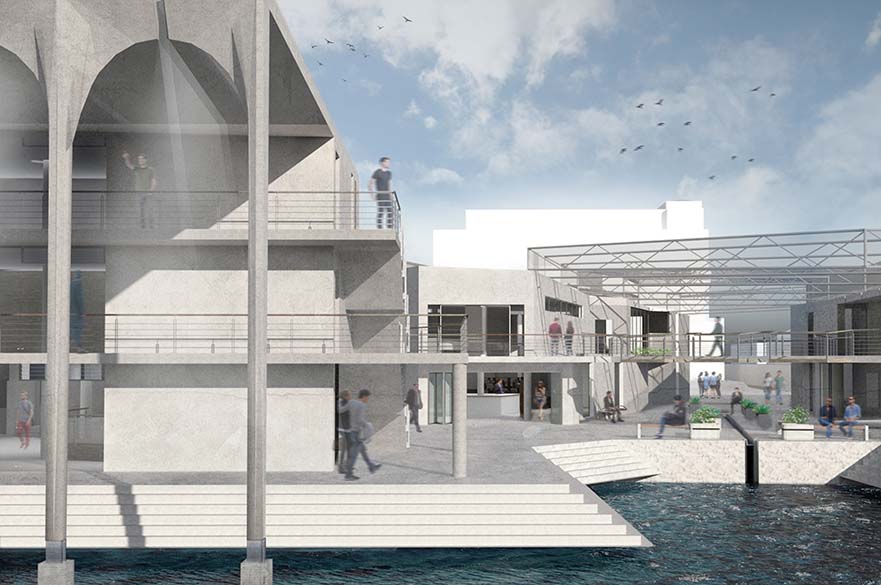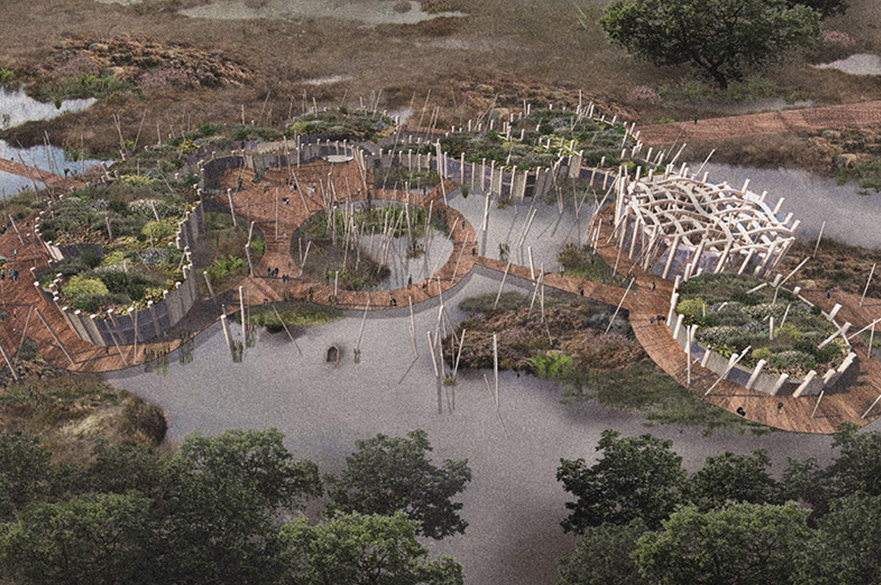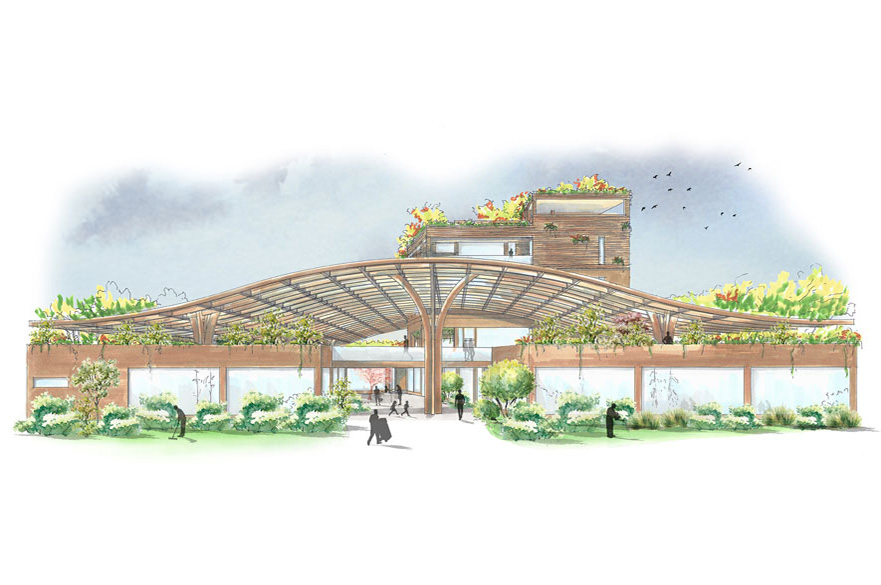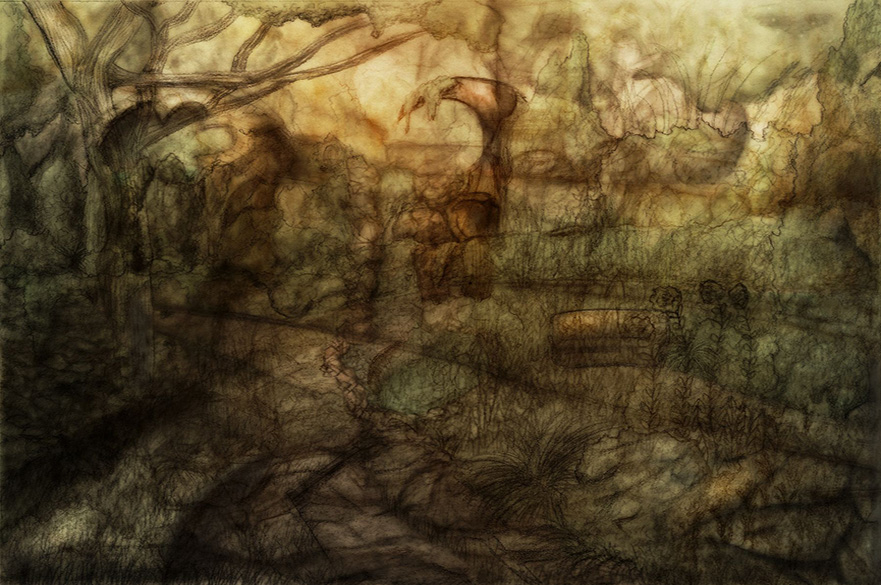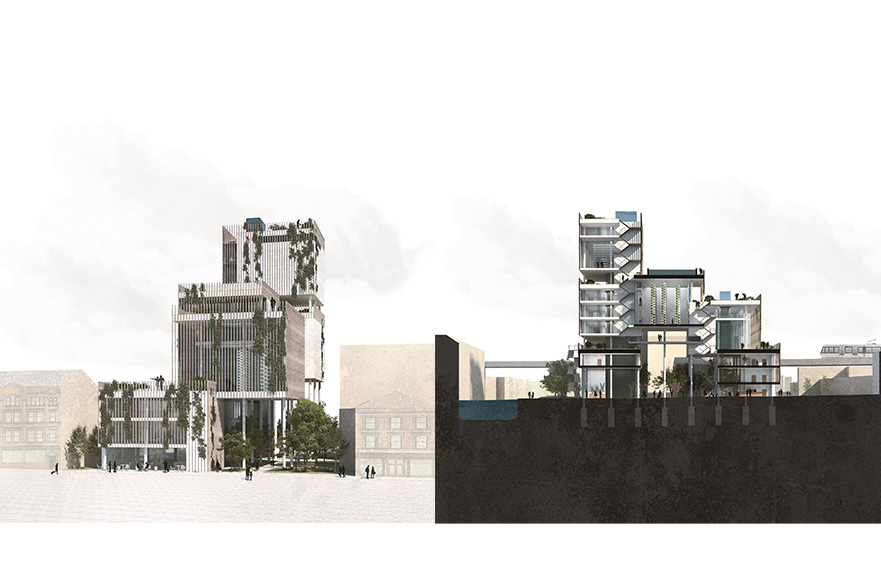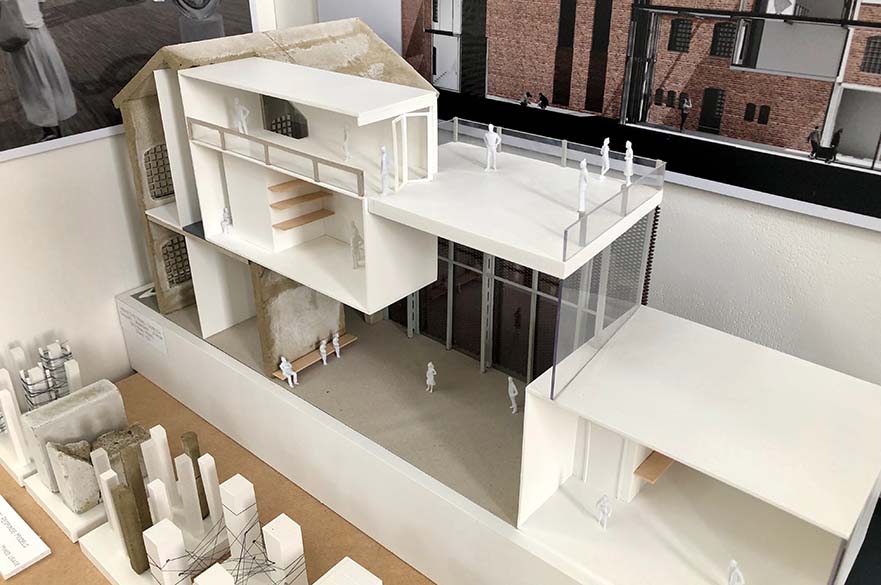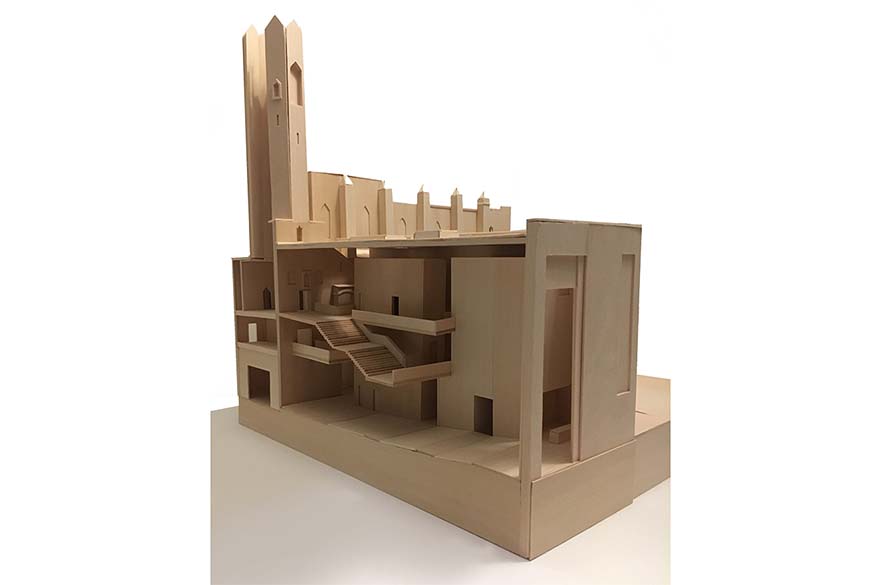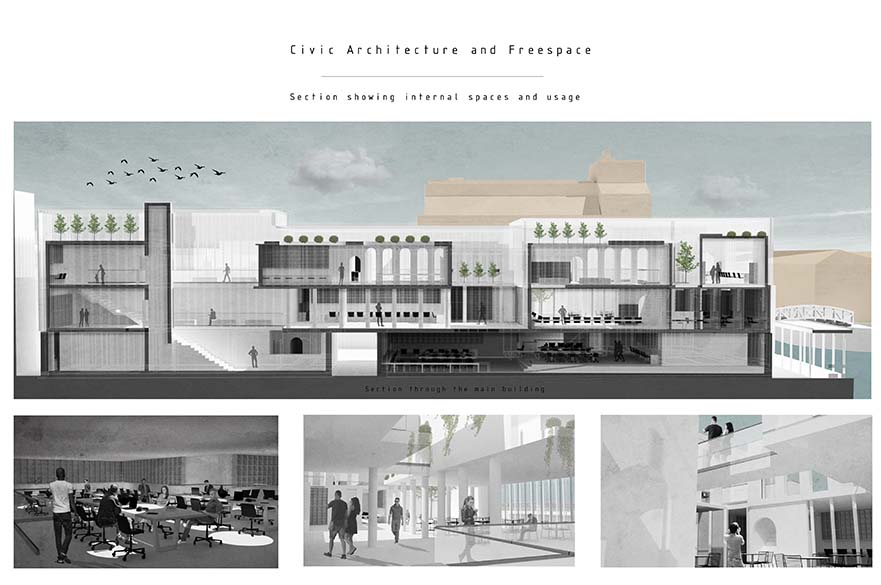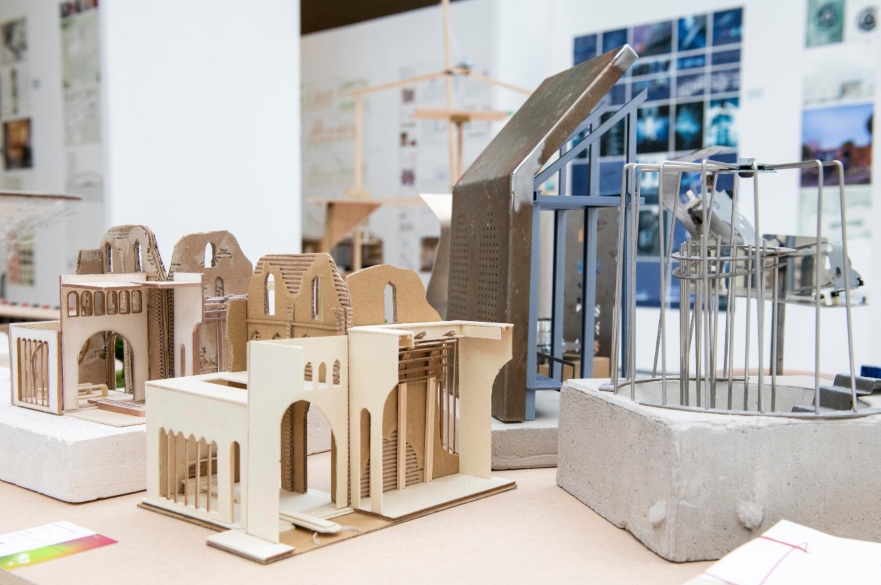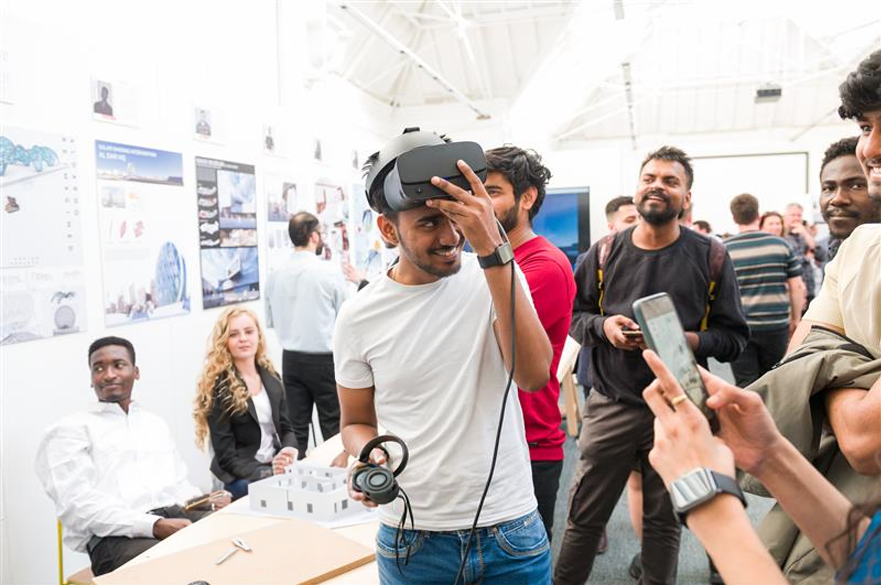This course is in Clearing
Offers from 80 tariff points
About this course
Validated by the Royal Institute of British Architects (RIBA), this creative, project-driven course is designed to help you develop your own design approach and style.
You’ll be exposed to diverse aspects of architectural design, linking sustainability and urban design with business practice. This course will equip you with skills and knowledge to tackle contemporary issues related to the built environment, exploring the design, human, professional and technical influences needed to pursue a successful career in architecture.
Reflecting modern architectural practice, our studio culture encourages you to work collaboratively, share experiences and experiment with ideas. You’ll learn the art of creative communication through drawing, model-making and 3D visualisation in our industry-standard design studios and materials workshops.
Explore the work of our graduating students in our Student Showcase.
Find out how this course compares to BSc (Hons) Architectural Technology and BA (Hons) Interior Architecture and Design.
Professional, statutory and regulatory bodies
*The BArch Architecture at Nottingham Trent University is currently prescribed by the ARB (Architects Registration Board) at Part 1 level for purposes of registration as an Architect in the UK. The ARB is currently revising its requirements for registration, and is removing from its requirements the award of an undergraduate qualification in architecture. The intention of the ARB is that its prescription of Part 1 qualifications will cease on 31st Dec 2027.
Students entering the BArch Architecture course in Sept 2024 who graduate before 31st Dec 2027 will not be affected by this change. Students who take an additional year to complete the course will graduate in June 2028 and will therefore graduate after the proposed end date for ARB prescription at Part 1 and their degree will therefore not be a prescribed ARB award. This will not impact any student’s ability to complete qualification as a UK registered architect, as the ARB will continue to accredit academic awards at master’s level only. The BArch Architecture course is currently, and will continue to be, subject to validation by the RIBA (Royal Institute of British Architects) at Part 1. The RIBA will continue to validate architecture qualifications at Parts 1, 2 and 3 – these are terms developed by the RIBA and its three-part validation pathway forms the typical route to RIBA Chartered Membership.
What you’ll study
Over three years, you'll develop the skills, knowledge and experience needed for a successful graduate career. You'll develop a solid foundation of design skills, theory and terminology, before working on complex and demanding projects as your studies progress.
Year One
- Design Studio (60 credits)
- Technology and Environment in Architecture 1 (20 credits)
- Architecture in Context 1 (20 credits)
- Architectural Communication and Representation (20 credits)
Year Two
- Integrated Design Studio (60 credits)
- Technology and Environment in Architecture 2 (20 credits)
- Architecture in Context 2 (20 credits)
- Interdisciplinary Design Studies (20 credits)
Final Year
- Professional Practice (20 credits)
- Comprehensive Design Studio (60 credits)
- Architecture in Context 3 (20 credits)
- Technology and Environment in Architecture 3 (20 credits)
- Degree Show exhibition
In Year One, you'll establish foundations in architectural design, communication and representation, contextual studies, technology and environment. You'll develop your creative ability to design in a variety of spatial, cultural and temporal contexts through project work and learn about the mechanisms associated with building production.
Design Studio (60 credits)
- This module will introduce you to small-scale design project work, exploring the three-dimensional qualities of space.
- You'll look at the range of factors that influence architectural design, and develop the skills to critically appraise design proposals.
- Some of the projects included in this module are set within the context of specific cultural communities and social groups, enabling you to put together design proposals that respond to social, cultural and aesthetic needs.
Technology and Environment in Architecture 1 (20 credits)
- This module will introduce you to a range of technical, practical and environmental principles involved in the making of small-scale architecture.
- You'll look at the structural, load-bearing capabilities and performance qualities of materials in order to understand the suitability of different construction materials. The module will focus on passive environmental strategies to achieve thermal, ventilation, sound, and light control in buildings through design and construction. You'll also look at sustainable design and consider health and safety in construction.
- The module will provide a framework for understanding the environmental impact of buildings within the UK, along with an awareness of the impact of design within other contexts. You'll learn about UK regulations, environmental considerations, and sustainability – knowledge to help underpin successful architectural design.
Architecture in Context 1 (20 credits)
- This module looks at how wider social issues, such as politics, the economy and technology influence architecture, both throughout history and in current times.
- You'll learn to recognise and engage with architectural responses to these influences by studying a variety of historical and cultural themes within an architectural framework.
Architectural Communication and Representation (20 credits)
- This lecture and studio-based module will introduce you to a range of visualisation techniques using traditional and digital media. You'll learn how to convey your design ideas using 2D and 3D methods and techniques, including orthographic drawing by hand, using digital media, model making, and presentation.
- You'll learn about the professional conventions and standards used for the communication of a design idea, from inception through to construction.
Your Year Two studies will enable you to integrate your understanding of cultural contexts, technology and environment, and awareness of approaches in allied professions. Your studio projects are interlinked with your other design modules to ensure a truly inter-disciplinary approach.
Integrated Design Studio (60 credits)
- Building and on the skills you'll have developed in Year One, this module offers a variety of different projects relating to medium-scale buildings and spaces.
- To demonstrate your growing knowledge of materials and design principles, you'll be challenged to develop creative responses to a variety of different urban, physical, technical, economic, social, ethical and cultural settings.
- You'll work on your ideas from conception through to modelling, developing an understanding of the consequences of design decisions, culminating in a presentation of your designs through visual, verbal, written or electronic presentations.
Technology and Environment in Architecture 2 (20 credits)
- This module will develop your understanding and knowledge to allow you to make technical recommendations, communicating effectively with clients and stakeholders throughout the design process.
- You'll develop your knowledge of the appropriate construction process and technical design options for a variety of medium-sized building types, enabling you to choose appropriate solutions to satisfy a variety of aspects affecting an architectural project, such as building services, environmental control systems, buildings materials, environmental sustainability, financial constraints and both human and legal demands.
- You'll develop a critical understanding of environmental and sustainable impacts of decisions and develop an awareness of construction processes and workmanship.
Architecture in Context 2 (20 credits)
- The module aims to develop your understanding of contemporary and emerging debates in architecture, the arts and urban design – both locally and globally.
- You'll explore issues of cultural diversity and the impact this has on the built environment, identifying the needs, perceptions and values of specific cultural communities.
Interdisciplinary Design Studies (20 credits)
- This module will widen your understanding of design, looking at a range of creative disciplines beyond building construction and various digital representation techniques.
- The module aims to situate your understanding of architecture as a collaborative discipline and building your understanding of how humans apprehend and interact with space.
In your Final Year, you'll further develop the creative abilities associated with a holistic approach to architectural design and thought. You'll critically examine a range of related areas, including ethical positions on technological decision-making in the context of global sustainability, human habitation in a multi-cultural world, and engagement with contemporary architectural challenges.
Professional Practice (20 credits)
- This module will specifically prepare you for your graduate career, focusing on key skills, qualities and attributes that employers will expect from an architecture graduate.
- These include professionalism and ethics, personal organisation and time management, practice management, entrepreneurship, and business management. You'll be fully prepared in all elements of project management, from procurement to health and safety, and from presentation skills to understanding statutory regulations.
Comprehensive Design Studio (60 credits)
- Building on your developments in Year Two, this module will focus on larger-scale or more complex projects, designed to extend your ability to demonstrate awareness of context, external factors and constraints, as well as your ability to communicate your ideas in different forms.
- You'll be stretched to design in a variety of different situations, ranging from urban design to smaller exploratory projects, responding creatively to thematic challenges.
Architecture in Context 3 (20 credits)
- You'll build on your understanding of architectural theory by undertaking an individual piece of extended research, enriching your understanding of architecture's potential as a useful and meaningful cultural activity.
- Your chosen topic will focus on key issues or major contemporary debates in architectural thought, exploring historical, cultural or philosophical contexts through which architecture may be analysed, criticised, debated and understood. Your research project will be self-directed, with support from your academic team.
Technology and Environment in Architecture 3 (20 credits)
- This module will further your ability to incorporate technical innovation in your designs, through the development of acoustic, lighting, structural and material studies.
- You'll be set projects within a studio environment and tasked with investigating material possibilities by designing and building physical and digital models in simulated conditions. You'll use your findings to define and justify your technical and tectonic design proposals, with a consideration of UK regulations, cost, environmental and sustainable factors, fire safety, and the lifespan of materials.
Degree Show exhibition
In your final year, you'll be invited to display your work as part of NTU's Degree Shows. The events are an opportunity for all Final Year students studying ADBE's design-based courses to showcase their work to our network of industry professionals and prospective employers, invited specifically for this purpose.
We regularly review and update our course content based on student and employer feedback, ensuring that all of our courses remain current and relevant. This may result in changes to module content or module availability in future years.
Don’t just take our word for it, hear from our students themselves
Student Work
Video Gallery
How you're taught
You’ll learn through a mix of:
- lectures - covering the key theories
- studio projects - working both independently and as groups
- live briefs - from industry and competitions
Outside of timetabled sessions you will need to undertake self-directed independent study. This will include preparing for lectures, researching, completing coursework, developing a portfolio, and directed reading to expand your knowledge.
Based on 40-hour weeks during term time, you will spend approximately 16 hours per week in scheduled learning.
The course is supported by external professional practitioners, ensuring that your learning is continuously enhanced through exposure to real-world perspective. This includes our guest lecture series, where an industry expert is invited to deliver a talk to expose our students to the work currently happening in architecture practices. You'll also have the opportunity to get involved with our RIBA student mentoring scheme in your final year, working alongside local firms, to develop your skills and knowledge.
Study trips
Field trips and study visits are an important part of your learning. Trips may include site visits and visits to practices, museums, exhibitions and events. Where a trip is mandatory it will be aligned to your modules and inform project work, and substantive costs – including travel and accommodation – will be paid for by the school.
Optional trips may also be organised which can provide additional opportunities to enhance your knowledge and experience. Optional trips will incur an additional cost of approximately £500 for participating students.
A valid passport and any associated visas will be required for trips outside of the UK.
94% of Architecture students are positive about the teaching on their course (NSS 2024).
93% of Architecture students are positive about the academic support on their course (NSS, 2024).
Design studios
Your design studios are a big part of your learning and reflect the approach typically encountered in professional architectural practice. Collaboration is key as you study with your peers to address a range of creative approaches, moral, aesthetic and theoretical positions related to your projects.
Design modules
Design modules are delivered through structured projects, supported by lectures and tutorial, seminars, workshops, peer-to-peer interaction and group reviews. Design projects will vary from academic and theoretical, to live and practical. You'll receive regular feedback on your design work through one-to-one catch-ups, via tutorials, and in public design reviews.
Design-based projects
Design-based projects are supported by our studio environment where you'll work, develop, prepare, display and review your work. As you progress through the course, the materials and model-making facilities you use become more important as you foster a 'learning by making' approach. Some of your projects may be set by our industry partners and based on real sites and briefs, to provide the opportunity to apply your learning, interact with, and present your ideas to professionals.
How you're assessed
People excel in different ways, and we want everybody to have the best possible chance of success. You will be assessed through:
- coursework, including group projects, case studies, research projects and live briefs
- practical assessments, such as individual presentations of project work
Careers and employability
We've got a great track record of producing skilled, industry-ready graduates. Our BArch (Hons) Architecture course is designed to prepare you to take your first step in the architecture industry. Through working on real projects from industry, fieldwork, and creative briefs from industry clients, you'll be equipped with skills and experience to carry with you for the rest of your professional career.
You’ll be encouraged to undertake work experience alongside your studies, to expose you to professional practice and give you hands-on experience of it. You'll also be supported in your development with a final year mentoring programme, working alongside RIBA and local practices including Leonard Design Architects, Buckenham & Co and Franklin Ellis Architects.
Where do Architecture graduates from NTU work?
Recent graduate roles include architects, architectural assistants and design team members at leading companies such as:
Benoy, Foster + Partners, Atelier New York, Terry Farrell and Partners, Dixon Jones, Balfour Beatty, PolkeyCollins, Peldon Rose Group, Virgin Media/
Becoming an Architect
Successful completion satisfies the educational requirements needed for your RIBA Part 1 qualification. Following this, you’ll be ready to complete your first year of experience before starting Part 2, on your way to becoming a qualified architect.
Employability team
Our expert Employability team will work closely with you at every stage of your career planning, providing personal support and advice. You can benefit from this service at any time during your studies, and for up to three years after completing your course.
Throughout the year, our Employability team runs a series of events specifically for students studying in the School of Architecture, Design and the Built Environment. This includes our annual Architecture Exchange event which brings together current students and prospective employers for an evening of presentations, round table discussions and networking opportunities. We also run a Property, Design and Construction Fair, offering employers the opportunity to advertise graduate roles to our final year students.
NTU Enterprise
You'll also have the opportunity to turn your ideas into a viable business with help from NTU Enterprise, NTU's purpose-built Centre for Entrepreneurship and Enterprise, a support centre to help students create, develop and grow their own businesses.
What our students are doing now
Sustainable innovation earns NTU Architecture student prestigious RIBA award commendation
We are proud to celebrate BArch (Hons) Architecture student Elliot Tiney, who has been recognised with a Part 1 Commendation in the RIBA East Midlands Student Awards 2024.
Employer-led project - Developing a new creative and sustainable community
Students Help NTU Move Towards Sustainability Targets with Real-World Problem Solving
Campus and facilities
As an Architecture student you'll have full access to our dedicated studio space, based in our Grade II* listed Gothic Revival Style Arkwright building. This is where you'll spend the majority of your time studying, supported by our expert team of academic and technical staff.
Our studio is a perfect space for you to develop your skills in sketching, physical model-making and computer software as part of the design process. You'll be introduced to various programmes throughout the course including Adobe Photoshop and InDesign, AutoCAD, Sketchup, REVIT and VRay to complete your work.
Entry requirements
This course is in Clearing
Looking for a place in Clearing? We are accepting application and would love to hear from you!
UK students
This course is in Clearing
Looking for a place in Clearing? We are accepting applications and would love to hear from you!
Clearing requirements
From 80 UCAS tariff points from up to 4 qualifications.
To discuss our entry requirements and see what we can offer you, call us now on +44 (0)115 848 6000. Alternatively, if you already have your qualifications, apply online via our Clearing Application form.
Preparing for results day? Beat the queue and sign up for NTU Priority for up-to-date information about all things Clearing. You’ll get an offer ahead of Clearing, subject to you achieving the required grades on results day.
Additional requirements
To find out what qualifications have tariff points, please use our tariff calculator.
Additional requirements for UK students
There are no additional requirements for this course.
Contextual offers
If you don’t quite meet our entry requirements, we might be able to make you a lower offer based on a range of factors, including your background (such as where you live and the school or college you attended), your experiences and your individual circumstances (you may have been in care, for example). This is called a contextual offer, and we get data from UCAS to help make these decisions. We do this because we believe everyone with the potential to succeed at NTU should have the opportunity to do so, no matter what barriers you may face.
Meeting our entry requirements
Hundreds of qualifications in the UK have UCAS Tariff points attached to specific grades, including A-levels, BTECs, T Levels and many more. You can use your grades and points from up to four different qualifications to meet our criteria. Enter your predicted or achieved grades into our Tariff calculator to find out how many points your qualifications are worth.
Other qualifications and experience
NTU welcomes applications from students with non-standard qualifications and learning backgrounds, either for year one entry or for advanced standing beyond the start of a course into year 2 or beyond.
We consider study and/or credit achieved from a similar course at another institution (otherwise known as credit transfer), vocational and professional qualifications, and broader work or life experience.
Our Recognition of Prior Learning and Credit Transfer Policy outlines the process and options available for this route. If you wish to apply via Recognition of Prior Learning, please contact the central Admissions and Enquiries Team who will be able to support you through the process.
Getting in touch
If you need more help or information, get in touch through our enquiry form.
International students
This course is in Clearing
Looking for a place in Clearing? We are accepting applications and would love to hear from you!
Clearing requirements
From 80 UCAS tariff points from up to 4 qualifications.
To discuss our entry requirements and see what we can offer you, call us now on +44 (0)115 848 6000. Alternatively, if you already have your qualifications, apply online via our Clearing Application form.
Preparing for results day? Beat the queue and sign up for NTU Priority for up-to-date information about all things Clearing. You’ll get an offer ahead of Clearing, subject to you achieving the required grades on results day.
Additional requirements
English language requirements: See our English language requirements page for requirements for your subject and information on alternative tests and Pre-sessional English.
Other requirements
Additional requirements for international students
If you need help achieving the academic entry requirements, we offer a Foundation preparation course for this degree. The course is offered through our partner Nottingham Trent International College (NTIC) based on our City campus.
English language requirements
View our English language requirements for all courses, including alternative English language tests and country qualifications accepted by the University.
If you need help achieving the language requirements, we offer a Pre-Sessional English for Academic Purposes course on our City campus which is an intensive preparation course for academic study at NTU.
Other qualifications and experience
If you have the right level of qualifications, you may be able to start your Bachelors degree at NTU in year 2 or year 3. This is called ‘advanced standing’ entry and is decided on a case-by case basis after our assessment of your qualifications and experience.
You can view our Recognition of Prior Learning and Credit Transfer Policy which outlines the process and options available, such as recognising experiential learning and credit transfer.
Sign up for emails
Sign up to receive regular emails from the International Office. You'll hear about our news, scholarships and any upcoming events in your country with our expert regional teams.
Getting in touch
If you need advice about studying at NTU as an international student or how to apply, our international webpages are a great place to start. If you have any questions about your study options, your international qualifications, experience, grades or other results, please get in touch through our enquiry form. Our international teams are highly experienced in answering queries from students all over the world.
Policies
We strive to make our admissions procedures as fair and clear as possible. To find out more about how we make offers, visit our admissions policies page.
